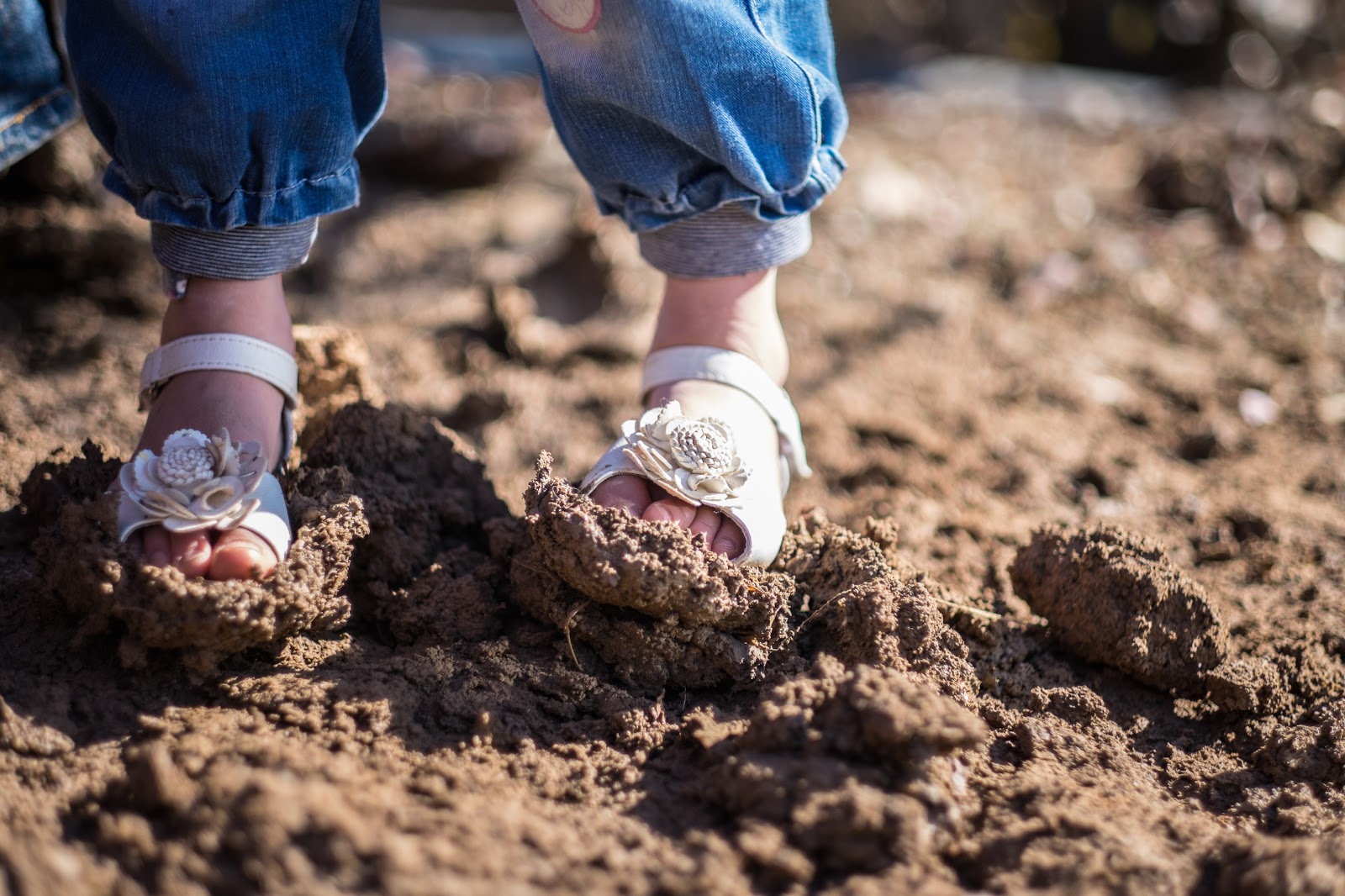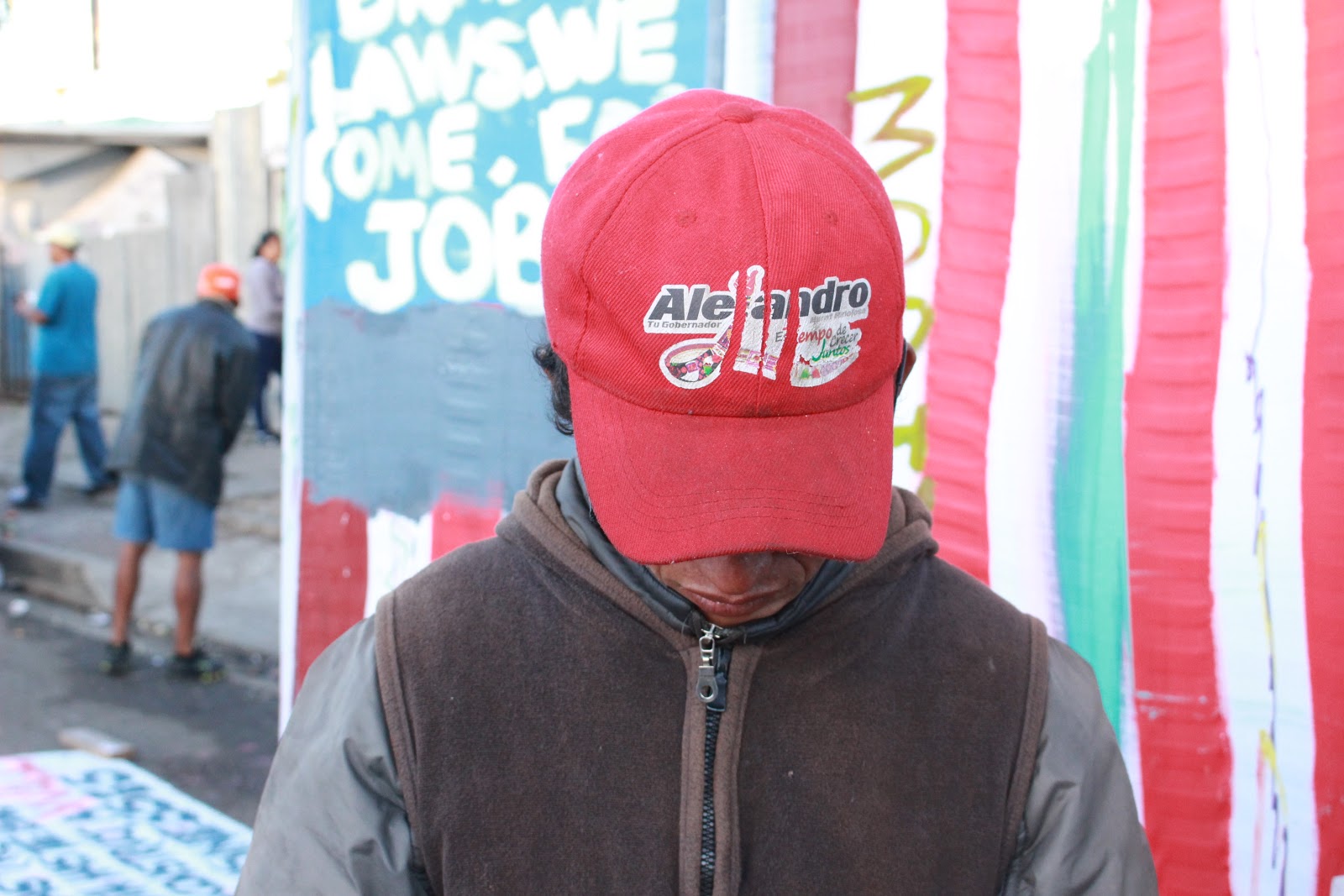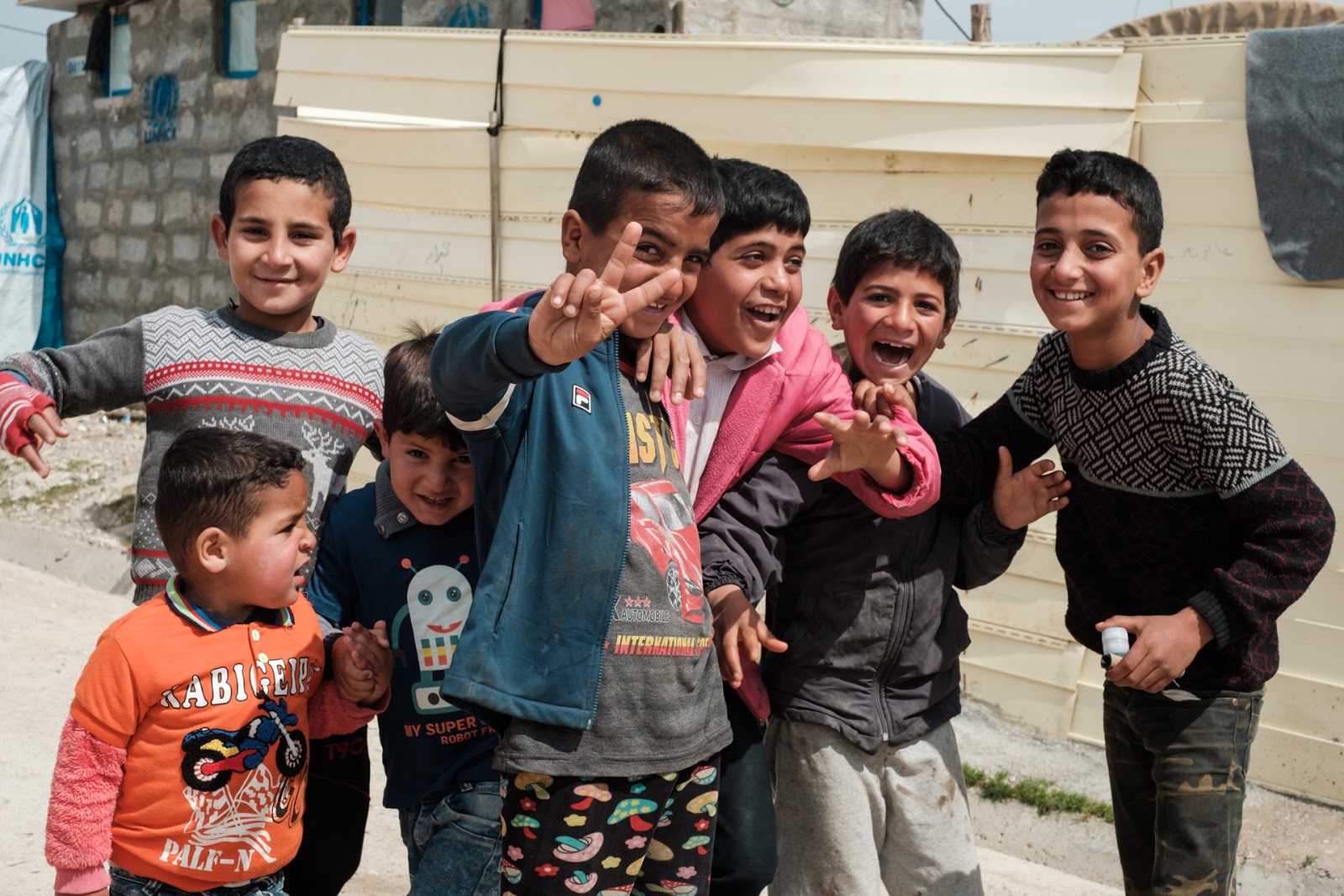
Episode 4: The Border Wall
WARNING: This episode contains references to sexual violence that may be triggering to some listeners.
We travel with Matt Malcom to Tijuana to hear the stories of men, women, and children seeking safety at the US/Mexico border. Join us as we discuss the borders we build around our own hearts—and how we can dismantle them.
Share this episode
Show Notes
When we’re afraid, we build walls around ourselves. We yearn for protection. To feel safe. We hem ourselves in. And keep others away. But what happens when our felt safety comes at a cost? What happens when our fear of “the other” contributes to others not being protected…or safe?
Who is “the other,” anyway? How do we start deconstructing the walls around our hearts?
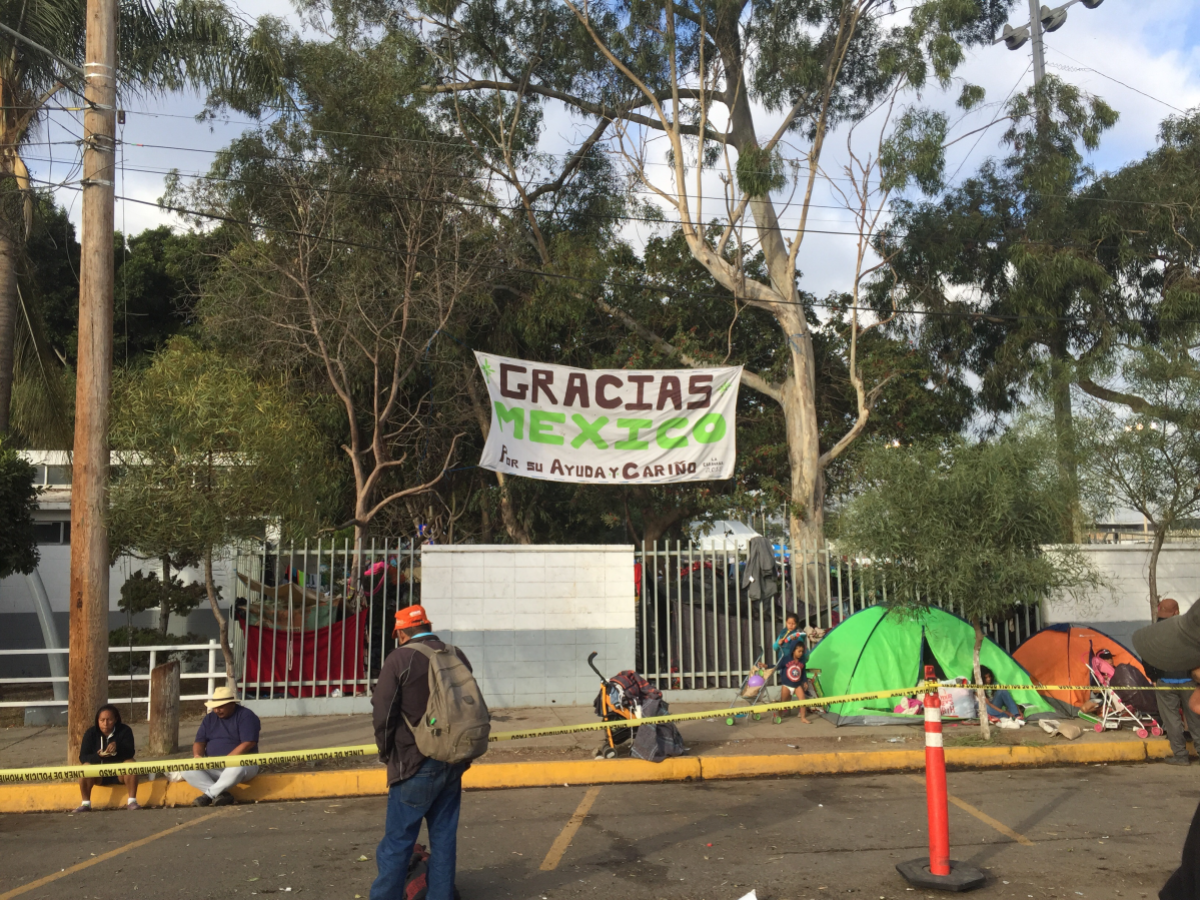
On episode 4, “The Border Wall,” you’ll hear from:
- Erin Wilson: Preemptive Love’s senior field editor in Iraq, she brings experience and compassion as the host of our Love Anyway podcast.
- Matt Malcom: On a trip to visit family in Texas in November 2018, Matt found himself returning close to the US/Mexico border. Matt is a West Point graduate, who served in the army for two years before leaving as a conscientious objector. He was also a new member of the Preemptive Love team.
- Felix: Connecting over shared history in the US military, and their heart for peacemaking, Felix and Matt connected at a Veterans for Peace post in Tijuana. Felix volunteered to translate interviews when he learned Matt was hoping to interview migrants but didn’t speak Spanish.
- Elma: Seeking safety for her children from gang violence, Elma walked from her home in Honduras to the US/Mexico border.
- JeanCarlos: JeanCarlos left his home in Honduras months before a caravan of desperate individuals began to take form as they fled north. He hopes to immigrate legally.
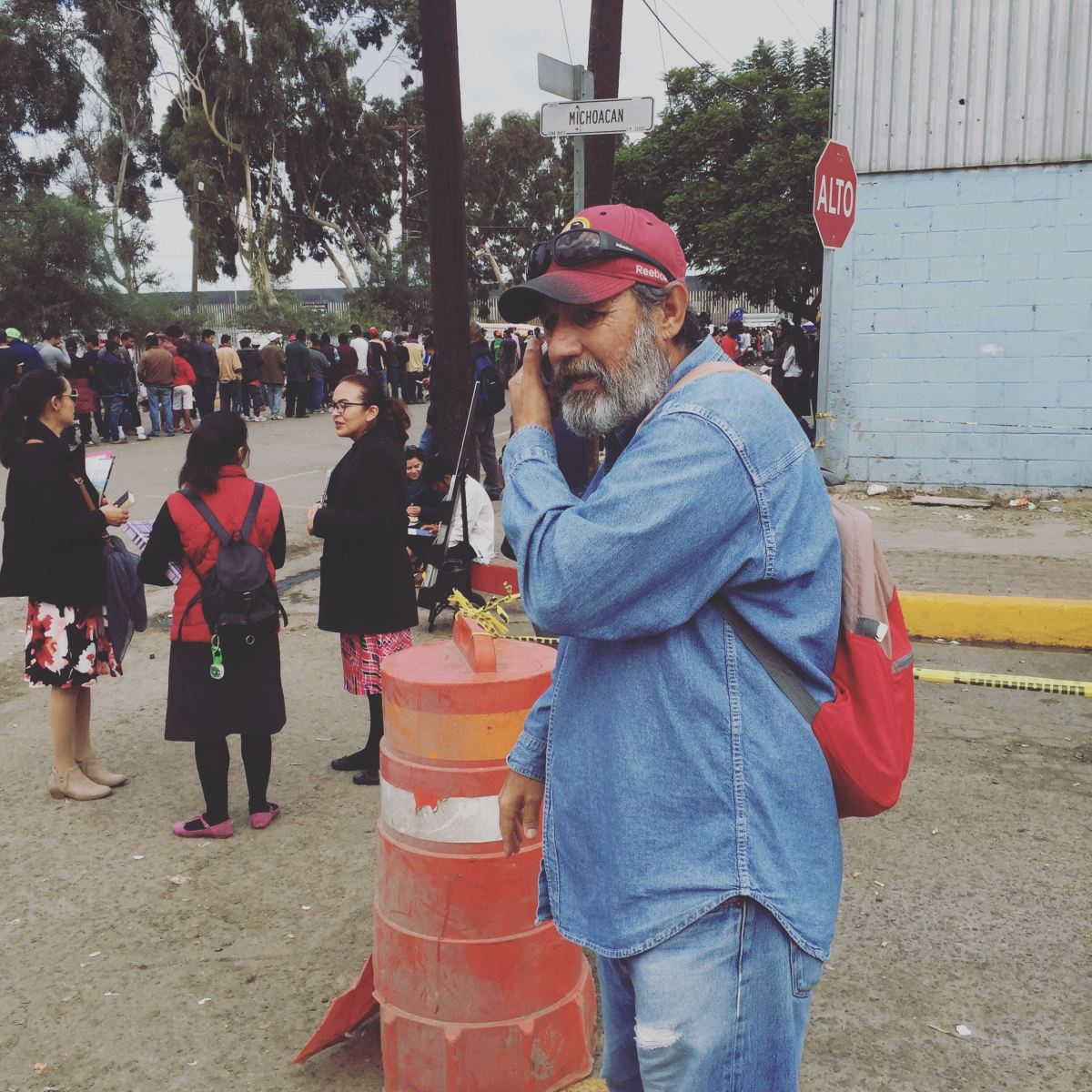
While in Tijuana, Matt recorded an update for friends and family describing what he was seeing, hearing, and experiencing on Nov. 24. Here’s the raw audio.
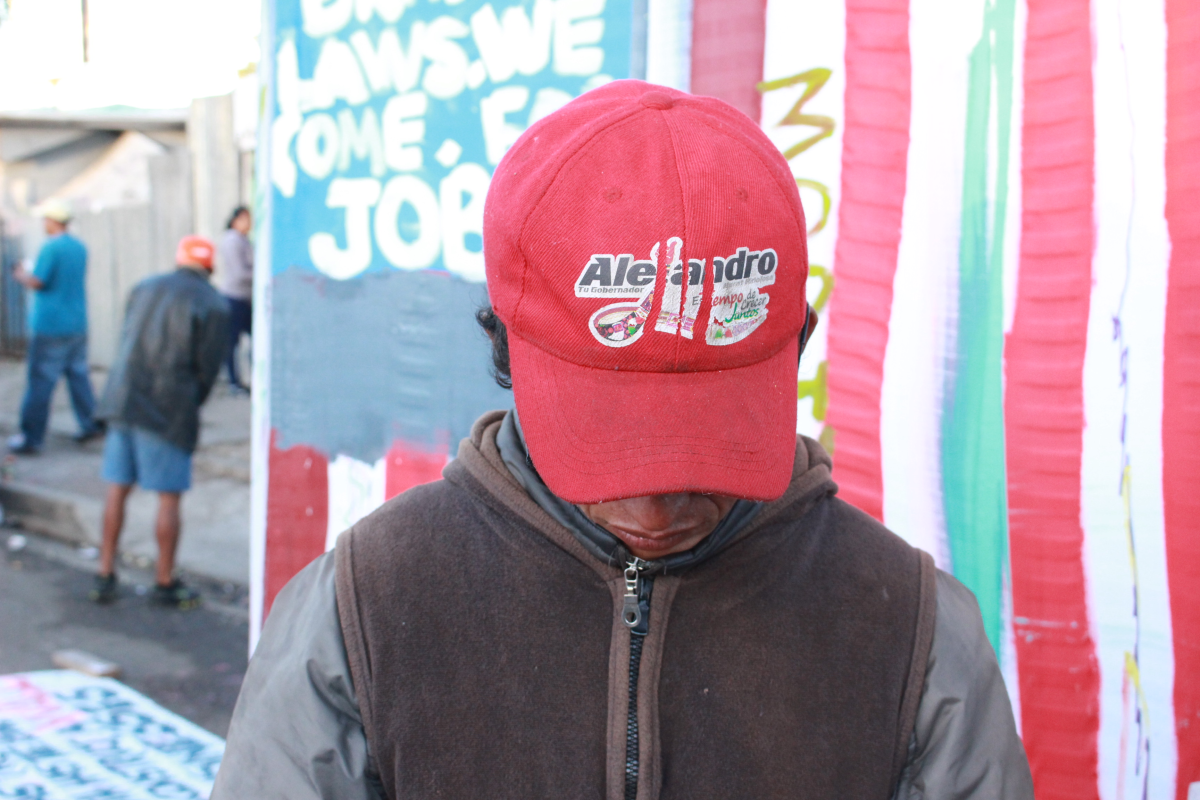
In this episode, Erin asks: Where do we go from here? Where do these women, men, and children go? At the time of recording, a Federal judge just gave the Department of Health and Human Services six months to locate thousands more children and parents who crossed into the United States and were potentially separated at the southern border under a policy intended to deter illegal immigration.
It’s easy to separate people into general categories, to reduce their reasons for leaving home down to a single motivation: war, oppression, opportunity.
The real reasons people leave are more specific and often, much more closely aligned to our own situations, with our own hearts. At the border and beyond, our refugee friends, asylum seekers, and migrants alike are struggling to preserve their basic safety and the safety of their families.
It’s up to us to start tearing down the borders that divide us, starting with the walls we’ve built around ourselves.
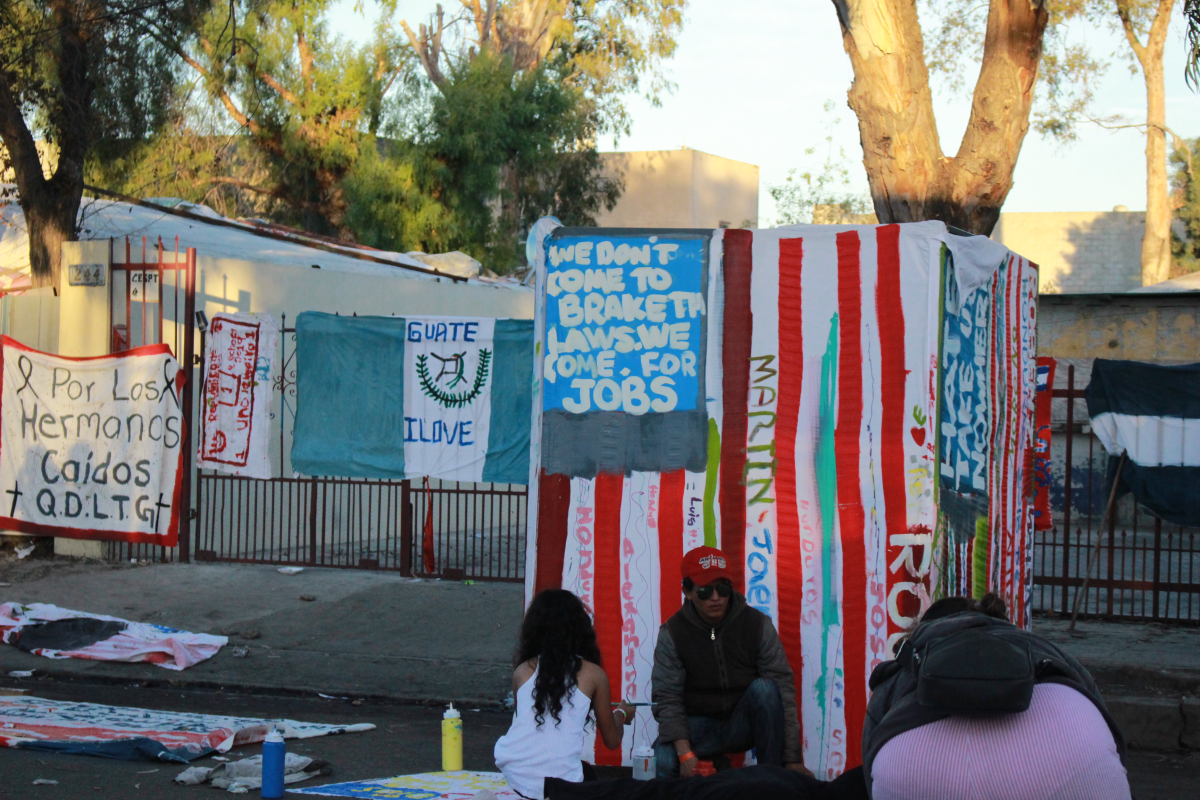
Discussion Questions:
- Matt was riveted by the headlines of a migrant crisis on the US southern border, trying to figure out how to dismantle long-established walls he’d constructed around his own ideas of safety and security. How do you define safety and security in your life? Where do your definitions come from?
- Erin mentions that in Iraq, we’ve learned a lot about refugees and displaced people. That it’s a wrenching decision to flee home, even when the safety of your family is at risk. How does “home” figure into your identity, your social network, and your ability to understand where you fit in the world?
- Elma and JeanCarlos vulnerably share their stories of getting to Tijuana. What surprised you about their experiences of leaving their home countries?
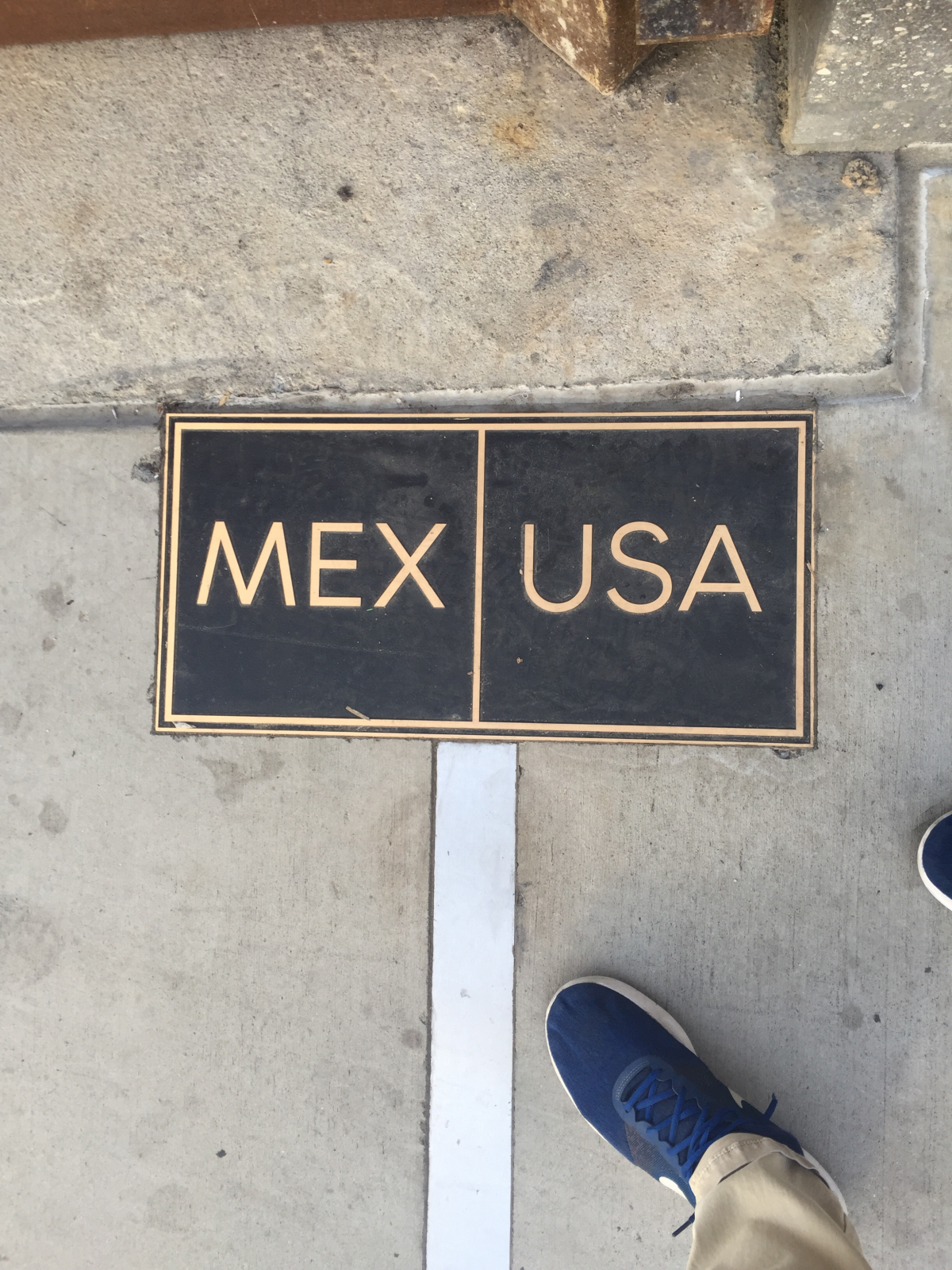
Love Anyway is written and produced by Kayla Craig, Ben Irwin, and Erin Wilson. Skip Matheny is our digital production director. Dylan Seals is our sound engineer. Jeremy Courtney, Jessica Courtney, and JR Pershall are executive producers. Special thanks to Matt Malcom, Felix, Elma, JeanCarlos, and Richard. Featured music was provided by Sleeping at Last and Roman Candle.
Don’t miss an episode. Subscribe now on apps like Apple Podcasts, Google Podcasts, and Spotify.
Additional Resources
Full Transcript
Matt: The thing was: I had started wearing their fear, and I started believing it. Because it’s so powerful. And it’s like the common-sense approach to the situation was that you should be afraid. So I just said, “I at least have to try.”
MUSIC
Erin: When we’re afraid, we build walls around ourselves. We yearn for protection. To feel safe. We hem ourselves in. And keep others away. But what happens when our felt safety comes at a cost? What happens when our fear of “the other” contributes to others not being protected…or safe?
And let’s be honest: Who IS “the other”…anyway?
MUSIC
Erin: How do we start to deconstruct the walls around our hearts?
On a trip to visit family in Texas in November 2018, my colleague Matt Malcom found himself returning close to the US/Mexico border. Matt is a West Point graduate, who served in the army for two years before leaving as a conscientious objector. He was also a new member of the Preemptive Love team.
Matt was riveted by the headlines of a migrant crisis on the US southern border, and now he found himself so physically close to the hundreds of Central American migrants in the news clips he couldn’t turn away from. As he watched, he was trying to figure out how to dismantle long-established walls he’d constructed around his own ideas of safety and security.
But no one was expecting what would happen next. Especially Matt.
This is Episode 4, “The Border Wall.”
I’m your host, Erin Wilson, Preemptive Love’s senior field editor in Iraq. And you’re listening to the Love Anyway podcast.
MUSIC
News clip: A march 2,300 miles in the making ran into a closed border and tear gas on Sunday at the San Ysidro crossing in Tijuana. U.S. border guards fired the gas across the border into a crowd of thousands seeking asylum in U.S., after hundreds tried to rush the fence to cross.
Erin: It was Thanksgiving week. Matt was traveling to visit relatives. But rather than thinking about sweet potatoes or craving cranberry sauce, he had other things on his mind as he flipped the channels.
Matt: I was waking up all of a sudden, like most people in the States, to this impending doomsday scenario where all these, these migrants, from Honduras, Nicaragua, El Salvador and Guatemala were traveling in a massive line right up the heart of Mexico to come break into our country and do all sorts of nefarious things. That was what got my attention.
I was like, “What? What are we talking about? What? This doesn’t…” You know?
And so it just caught my attention enough to really get interested in it.
Erin: Matt was commissioned as an officer in the Army: a Second Lieutenant. His move away from the military and into the role of peacemaker included time spent with the Cadet Prayer, which you can find in front of the cadet chapel at West Point. The prayer includes these words, “Help us to choose the harder right over the easier wrong, and not settle for the half truth when the whole can be won.” Since then, Matt has been ever pressing into choosing that ‘harder right’.
Matt: I connected pretty early on with a guy named Gavin Rogers, who is a pastor from San Antonio, and he started…I think he also felt like me, like “What’s really going on?” You know?
And so he went, like…dude’s my hero…he went all the way. He flew down to southern Mexico, and just, like, got on flatbed trucks and walked on the roads with these people, for like a month.
Erin: Matt began to learn. To research. To ask questions. And most of all, to listen to people who were already on the ground, including Gavin.
Matt: He told me where they were, and what was going on, and we talked a lot about the legitimate humanitarian plight of these people, why they were leaving, what it was going to look like for them. And he’d had a couple of interactions with UN workers, who had joined the caravan too, and were documenting what was going on, and they were beginning to talk about what was happening as a refugee crisis from Central America.
Erin: Here in Iraq, we’ve learned a lot about refugees and displaced people. We understand that it is a wrenching decision to flee home, even when the safety of your family is at risk. No one takes that decision lightly. Home is so much more than a place to sleep at night. Home figures into your identity, your social network, your ability to understand where you fit in the world.
News clip: “What more are you seeing right now?” “Well listen, this is, Anna, one of the busiest border crossings in the world. And particularly busy this weekend with Thanksgiving with people coming back and forth.”
Matt: I was interested in this, because I wasn’t believing, I was like, “There’s no way that there’s all these people, like, the amount that we’re talking about, like, coming up here to declare their hostile intent against America. This doesn’t make sense.”
I’m like, “And I think, probably what’s going on is that there’s lots of people fleeing destabilization and violence, just like always happens with a refugee crisis.”
And so, you know, I wanted to get my hands on it, and then I talked to him, and he’s telling me, “Yeah, dude, like, this is turning into like a legitimate refugee crisis, right here on our border.”
And I was like, “Well, that’s my border, and no one’s telling me I can’t go, and it’s Thanksgiving holiday, so, I’m gonna go, you know?” [laughs]
Erin: For Matt, a step in tearing down the walls around his own mind and heart meant using his time off and resources to see it for himself. To use his friendship with Gavin, and connections with other on-the-ground advocates and organizations, to gather a team to observe. Not to be the hero of anyone’s story. But to listen.This wasn’t a work-related mission. He dipped into his bank account, got his wife’s blessing, used his time off, and got a plane ticket from Austin, Texas to San Diego, California.
Matt got to the border, thanks in large part to a benevolent Uber driver. Once he arrived, Matt stood facing the heavily fortified border crossing trying to wrap his mind around the disparity he saw between the Mexican side in front of him, and the fancy American mall at his back. The words from concerned friends and family rushed into Matt’s mind. What was he even doing? Should he just go home?
Matt: The things that people were telling me to scare me, was that I should be afraid of these people, and I should be afraid of the migrants, because they’re desperate. And, you know, they’re going to try to take advantage of me, and I should be afraid of people from Tijuana, because they’re not like “us,” specifically, was what people were saying.
And so I felt that if I were to turn around at, like…I’m looking at where I walk through to walk into Mexico. And I’m like, “if I turn around right here, I’m validating all of those voices.” And I don’t believe any of those voices. I don’t think any–that’s why I’m here, is to show people that those voices are just fear.
But the thing was, is that I had started wearing their fear, and I started believing it. Because it’s so powerful. And it’s like the common-sense approach to the situation was that you should be afraid. So I just said, “I at least have to try.”
And I was like, “Well, and at this point, I’ve got an Uber guy who will come get me, I’ve got some money.” And I had reserved a hotel somewhere in Tijuana, and I knew nothing about it. I was like, “I at least have a place to go.” And I did my best to make sure that it was relatively safe, because, you know, I was scared.
It got to the point where my Uber driver said, “Look. If you really feel like you have to go in,” and he really, like, he thought I was crazy, he’s like, “Go in, but just don’t spend the night. Stay there a couple hours, take some pictures, and then just come back and call me.”
And I was like, “Okay. If I get to that, I’ll let you know.”
Matt: So then, what’s really weird is that, uh, he drops me off at the border crossing, like where you can see the wall. And on the border is a massive, uh, mall complex, where just like huge shopping center, with like every staple of American capitalism in there, you know? Just like all the chain restaurants, all the big stores. And then on the other side is something very different.
News Clip: “That crossing, the busiest in the western hemisphere, only partially reopened last hour. A statement tonight from Homeland Security says the migrants sought to harm customs and homeland personnel by throwing projectiles at them and the agency warns the US won’t tolerate this type of lawlessness and will not hesitate to shut down other ports of entry.”
Erin: So what was happening at this point? There have been people fleeing Honduras, El Salvador, Guatemala and other countries for years, trying to find safety and opportunity in North America. But it wasn’t until this past October, when more than 1000 Hondurans made their way north, together, that the wider world—and the American public—seemed to take notice.
Since then, thousands more have traveled north, some in large groups, and some as small families and individuals. Collectively, they’ve become known as “The Caravan”, but there is no single, organized group.
The UN has decided that those fleeing could find safe places to live elsewhere in their home countries, so they are unwilling to declare a refugee situation, which would open up international funding to help.
The US has decided that it is unwilling to hear so many asylum claims, and has closed many of the channels that used to make that possible. Nevertheless, families continue to come north, willing to risk their lives for the chance that they might make it across the border—one way or another.
Matt: Migrants showing up to Tijuana isn’t new, but this many at once was new. And so it was just a stress on the system, and so everybody had kind of dropped what they were doing, and this was what was going on.
Erin: We’ll be right back.
MUSIC
SHOP AD
MUSIC
Erin: So there Matt was, crossing the border into Mexico. And what shocked him was how quiet the space was. And how, well, empty.
So he just kept walking. He eventually came across some organizations and nonprofits that had come, the first of them being a Veterans for Peace office. It was an organization he was familiar with. So he walked inside. A few minutes later, another man did, too.
Matt: And kind of the hero of my story, a man named Felix, walks in. He is one of the many people that works with this Veterans for Peace post, and most of them are deported veterans, who’ve served in the military and then been deported.
And we just start talking about life. I ask about his story, and how he ended up in Tijuana, how he got deported, and we just have a long conversation, getting to know each other. He was in the military about as long as I was. On active duty before I had to leave.
Erin: Matt explained why he was there. They connected over their shared history in the US military, and their heart for peacemaking. And when Felix realized Matt was hoping to interview migrants, but didn’t speak Spanish, he volunteered to translate.
Matt: The whole next day, we walked all around, interviewing as many people as we could. My fear, in the meantime, is just dropping. Because I’m getting real, I walked in alone, and I found, uh, a friend, a really good friend. And I found someone who was like me, and we fell into this great groove.
Erin: Matt and Felix walked along the street. Tiajuana had blocked off a few city blocks outside the baseball stadium that was acting as a migrant camp. There were thousands of people in this area getting food, asking questions, seeking help. Matt and Felix saw a mom and her family and went over to ask more questions, and permission to record.
Felix: Her name is Elma and she comes from Honduras.
Matt: Can you ask her when she left Honduras?
Felix & Elma: [Spanish translation and response]
Felix: The 17th of October…[Spanish]
Felix: And she came, she got here last night.
Matt: She arrived here last night.
Matt: Can you—is she traveling by herself?
Felix & Elma: [Spanish translation and response] Si, she’s traveling with three kids.
Matt: Three kids.
Matt: Does she have any family back in Honduras?
Felix & Elma: [Spanish translation and response]
Felix: She left her two daughters. One is 17, one is 16.
Matt: Ask her…what, what she’s hoping to do now that she’s arrived here.
Felix & Elma: [Spanish translation and response]
Felix: She said if she has family, she would stay here work. But she said, ‘I have no family.’
Matt: Is that…that’s why she left Honduras?
Felix & Elma: [Spanish translation and response]
Felix: Her son, they wanted to put him in gangs. And he didn’t want to do it. So they raped her 17-year-old daughter two months ago.
Matt: Oh my gosh.
Felix: So she left over here…she came over here to get her, bring her kids…
Matt: …to safety.
Felix & Elma: So they took revenge on her daughter.
Matt: Wow. Well…tell her I’m so sorry. Did she come with the big caravan group that came up?
Felix & Elma [Spanish translation and response] She said after her daughter got raped, she just came.
Matt: She just left.
Felix: She came before the caravan.
Matt: Did she walk?
Felix & Elma: [Spanish translation and response] She said yes.
Matt: She arrived last night.
Matt: Well, what’s it like for the children, to be on the trip?
Felix & Elma: [Spanish translation and response]
Felix: They’re desperate. They want to go.
Matt: Is she gonna try to cross into the US?
Felix & Elma: [Spanish translation and response]
Felix: Yes, yes…she’s going to try to cross to the United States.
MUSIC
Erin: Matt’s interview with Elma has stuck with him. He asked her what she was doing there at the border, and she really didn’t know.
Matt: That was a really common thing was that a lot of people didn’t know how they ended up there. They had left their home for a specific reason, and ran into thousands of people walking. And so walking with thousands of people was safer than what they were doing, which was just running away from something.
But I had did not talk to anybody who really had any sort of intention other than ‘I’m just trying to figure something out because I can’t provide for my family, or something very violent happened to me’ and that pretty much everybody I talked to is in that boat.
Matt: I did my best to try to find as many shady looking single men as I could find because I was determined to find somebody who I didn’t trust, you know. Because that’s what everybody’s worried about, is that oh, you know, these guys are criminals. They’re there. They’re here to invade and do all sorts of nefarious things. And the stories were just almost identical and they were very genuine.
It’s always ‘someone tried to kill me’, ‘someone tried to kill my family, so I left.’ ‘My family was starving, so I left.’ ‘I’m just looking for anything, I’ll take anything.’
And there was just a profound and a deep sense of, of desperation, just I’ll just take whatever I can get.
MUSIC
Erin: “I’ll just take whatever I can get.” That’s the refrain that Matt heard over and over again. That’s what he heard from JeanCarlos, who left his home in Honduras months before a caravan of desperate individuals began to take form as they fled north.
Matt: How long has he been in Mexico?
Felix: [Spanish]
Felix & Matt: Six months? Six months.
Matt: Why? Why did he leave?
Felix: No work.
Matt Malcom: No work?
Felix: No work.
Matt: And so he I guess he was here probably before…thousands of others.
Felix Yeah.
Matt: And so what is he hoping to do next?
Felix & JeanCarlos: [Spanish]
Felix: He has to cross, and make it to Canada.
Matt: Canada.
Felix: Last day in the United States.
Matt: What does he want to do?
Felix & JeanCarlos: [Spanish]
Felix He want…he wants to work, buy his house, buy his car, and bring his family. Of course not the way he came. But through a safer way, you know, a better way. Airplane.
Matt: How old is he?
Felix & JeanCarlos [Spanish]
Matt: 25. Me too. Okay yeah. I guess, if he if he could tell other people one thing about…who he is what he’s trying to do what what would that be?
Felix & JeanCarlos: [Spanish]
Felix: He said they want to do things legally…not not…working the wrong way. Work legally, and do the right things like follow the law.
Matt: Yeah.
Felix: Don’t work a job that they’re not with the law, you know?
Matt: Well, you can tell him if it was up to me, if I had the power, he’d be there now. But I don’t have any power…so…
Erin: After changes made by U.S. Citizenship and Immigration Services, gang and domestic violence are no longer reasons one can seek asylum in the United States, even if a person’s home government does not provide adequate protection. As a result, families like the ones you’ve heard today, fleeing threats of death by gangs, are considered migrants and therefore not granted any special protections or permitted to seek asylum in the US.
Much as he’d like to, Matt doesn’t have power to grant asylum status to anyone at the US southern border. He doesn’t have the power to stop gangs in Honduras that rape young women to exact revenge on their brothers. He doesn’t have a magic wand that grants justice wherever it’s needed.
But Matt absolutely has the power to examine the stories that cause fear to grow in his heart. He has the power to dig into news stories and to make his life an experiment in truth-seeking. He can listen, he can work to understand, he can stand with those who need a friend…and he can introduce others to the people he meets along the way.
MUSIC
Erin: We started this episode by asking the question: “Who IS “the other?”
The “other” are single moms with three children, and 25-year-old young men looking for work. In your neighborhood, the other might be bankers who love anime, bakers who ride motorcycles, and little girls who love nothing more than swinging their box braids. For the majority of the world–for Honduran migrants and Mexican grandmothers making sandwiches for strangers–I am the other. You are too.
MUSIC
Erin: As Matt stood at the border, ready to leave, he recorded this message:
Matt: Right now, I think we’re going to hopefully be looking for opportunities to come back in love anyway. It’s scary and it doesn’t make a lot of sense. And it seems like there’s nothing really to be done to help that much. And it seems kind of overwhelming. I think we’re going to really, really try to press into this and figure out what that could mean to not really care about all of those things, and just see the need and feel the empathy and the compassion for people who…if I was born in a different zip code, I could I would easily be doing what many of these people were doing.
Erin: Where do we go from here? Where do these women, men, and children go? At the time of recording, a Federal judge just gave the Department of Health and Human Services six months to locate thousands more children and parents who crossed into the United States and were potentially separated at the southern border under a policy intended to deter illegal immigration.
It’s easy to separate people into general categories, to reduce their reasons for leaving home down to a single motivation: war, oppression, opportunity.
The real reasons people leave are more specific and often, much more closely aligned to our own situations, with our own hearts. At the border and beyond, our refugee friends, asylum seekers, and migrants alike are struggling to preserve their basic safety and the safety of their families.
It’s up to us to start tearing down the borders that divide us, starting with the walls we’ve built around ourselves.
I’m Erin Wilson. This is Love Anyway podcast. Thanks for listening.
MUSIC
Erin: Visit this episode’s show notes at preemptivelove.org/podcast to hear further interviews Matt recorded at the border, and to read our easy-to-understand guide to recognize the difference between a person labeled as a refugee, migrant, or displaced.
Erin: In our next episode, you’ll hear from four Iraqi Millennials, about their views on life, work, gender divides, and what they wish the world knew about their generation. If you haven’t yet had a chance, be sure to listen to our past three episodes, which continue to peel back the curtain to the work we do at Preemptive Love. Thanks for listening.
MUSIC
Jeremy: Hi, I’m Jeremy Courtney, founder and CEO of Preemptive Love. Thanks for listening to the Love Anyway podcast. Don’t miss an episode. Hit subscribe now.
Erin: The Love Anyway podcast is written and produced by Kayla Craig, Ben Irwin, and Erin Wilson. Skip Matheny is our digital production director. Dylan Seals is our sound engineer. Jeremy Courtney, Jessica Courtney, and JR Pershall are executive producers. Special thanks to Matt Malcom, Felix, Elma, JeanCarlos, and Richard. Featured music was provided by Sleeping at Last, and Roman Candle.

